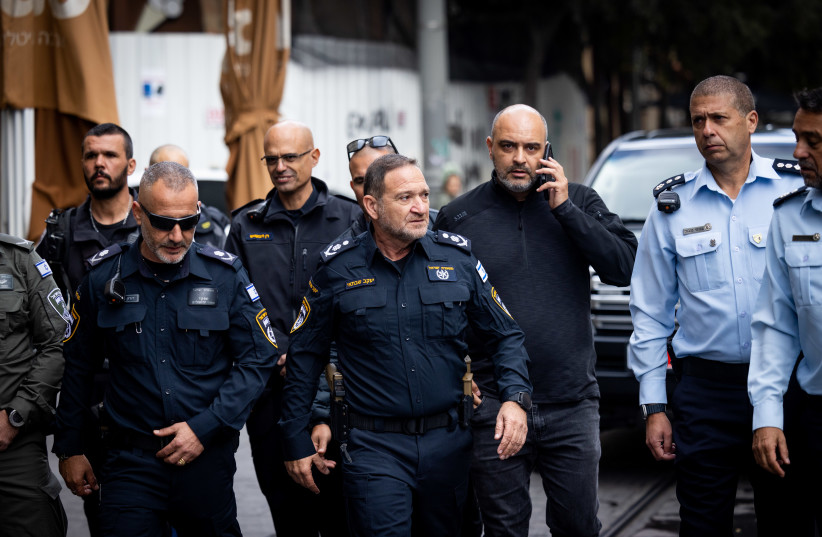Prime Minister Benjamin Netanyahu on Thursday highlighted defense, personal security and transportation as key subjects of focus within the proposed state budget for 2023-2024.
A two-day government meeting to go over the details of the budget was convened on Thursday, and it will culminate in a vote on the budget on Friday.
Though the exact sum is yet unknown, a multiyear defense budget was agreed upon by the Defense and Finance ministries, with help from the prime minister, on Wednesday night. This is the first multiyear defense budget to pass since 2015.
“First and foremost, we guarantee our continued strengthening and equipping ourselves against Iran and other enemies throughout the coming years,” Netanyahu said, adding that it was “a matter of supreme national importance.”
National security
He also referred to the issue of “personal security,” which is addressed within the budget by “adding thousands of police officers to the Israel Police,” as well as the establishment of a national guard and additional police stations.

“We are doing this in accordance with our promise to return the governance to the State of Israel – to the Negev, to the Galilee, to the cities of Israel, to the roads of Israel,” he said.
Lastly, Netanyahu referred to the budget enabling a “transportation revolution” by means of a high-speed train system that would allow commuters to travel from the periphery – “from Kiryat Shmona to Eilat” – to Tel Aviv within an hour.
Education
His initial statements briefly addressed the budget’s attention to the education system, which is a point of contention that resulted in a strike by local authorities and the High School Teachers Union on Thursday.
“We are going to do great things in education together with Education Minister Yoav Kisch, including a commitment we made to start a free education program from age zero to three,” Netanyahu said. “This is very big news. Here, too, we promised, and we are delivering.”
Issues with the budget were listed in the Federation of Local Authorities in Israel’s justification for the strike, namely, a lack of improvement to the terms on preschool assistants’ employment, no provisions for building classrooms, despite 100,000 students throughout the country studying in portable classrooms for lack of permanent facilities, no concrete resolution to seemingly perpetual teacher salary negotiations with the Finance Ministry and no advancement of five-year plans to develop Arab, Druze and Circassian local authorities.
Modi’in Mayor Haim Bibas, the CEO of the Federation of Local Authorities in Israel, said: “We held meetings and gave warnings, but the Finance Ministry does not care that hundreds of preschools are closing every day for lack of staff; it is not interested in the fact that children are studying in portable classrooms... We are in the last moments before the budget will pass, and we will not give in.”
After an emergency meeting on Thursday, the federation announced it would continue its strike on Sunday. Local authority leaders would drive garbage trucks to Jerusalem and park them outside of the government’s weekly meeting at 11 a.m. in protest, as garbage collection is also one of the local authorities’ services that will not operate during the strike, it said.
The government’s budget meeting reflected friction among the different ministries as they jostled for funding.
Despite Netanyahu’s pledge to bolster the Israel Police, National Security Minister Itamar Ben-Gvir did not attend the meeting. Four hours after it began, he appeared with an entourage in tow at the office of the cabinet secretariat while his colleagues were still engaged in the budget meeting.
In a private conversation, Ben-Gvir said the attendees at the budget meeting “have an aggressive policy of not giving anything. They just want to save and save... the amounts that they are suggesting are ridiculous. I did not come to the government for that.”
Ben-Gvir constitutes one of the obstacles on the path to approving a budget, in light of his demand for NIS 14 billion for his ministry to bolster the police, which was a central campaign promise. Reports in recent weeks quoted him as threatening to leave the government if his budgetary demands were not met.
Tourism Minister Haim Katz and Environmental Protection Minister Idit Silman reportedly did not attend the meeting for similar reasons.
Kisch also indicated that he was unhappy with elements of his ministry’s projected budget. On Thursday, he said he would oppose the Finance Ministry’s intention to reduce a fund intended for subsidizing academic studies for discharged soldiers who study in institutions in the periphery.
“We will not fix one injustice by another,” Kisch said. “The higher education institutions in the periphery need the support fund, and any attempt to divide this resource differently will severely damage them.”
The government’s flagship judicial reform also came into play during the budget meeting. Economy Minister Nir Barkat said businesspeople had warned him that the proposed budget could be trashed, since in any case, there would not be enough money to fund it due to economic damage caused by the reform,” KAN News reported, adding that he said it would “not be so bad” if a compromise on the reform was reached.
